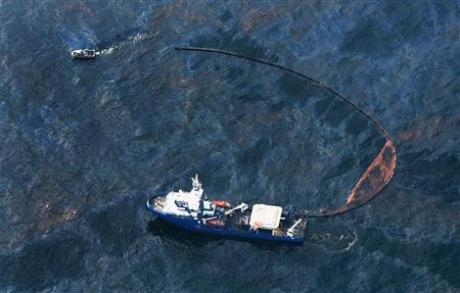Military may join fight to contain Gulf oil slick

(Reuters) - BP Plc on Thursday welcomed an offer from the Defense Department to help contain a massive growing oil slick from a deadly rig explosion that threatens the shoreline of four Gulf states.
BP and the Coast Guard have already mounted what the London-based company calls the largest oil spill containment operation in history, involving dozens of ships and aircraft.
But they are struggling to control the slick from the leaking well 5,000 feet under the sea off Louisiana's coast, which the Coast Guard said late on Wednesday was spilling five times more oil than previously estimated.
President Barack Obama has been briefed on the spill, which could cause serious environmental damage to coastal wildlife refuges, beaches and estuaries in Louisiana, Mississippi, Alabama and Florida.
"We'll take help from anyone, I mean we welcome the offer from the Department of Defense, we're working with the experts across the industry," Doug Suttles, chief operating officer of BP's exploration and production unit, said.
"We're not interested in where the idea comes from, what we're interested in is how do we stop this flow and how do we stop it now?" Suttles said on NBC's "Today" show.
He told ABC's "Good Morning America" show: "I believe our plan can handle the spill".
"We're going to do everything we can to minimize the impact of this event," Suttles said. As owner of the well, BP is financially responsible for the cleanup.
Eleven workers are missing and presumed dead after last week's worst oil rig disaster in almost a decade. Swiss-based Transocean Ltd's Deepwater Horizon rig sank on April 22, two days after it exploded and caught fire while finishing a well for BP about 40 miles southeast of the mouth of the Mississippi River.
The leak from the well blowout is now estimated at 5,000 barrels per day -- five times than previously estimated. The Coast Guard said that as of Wednesday afternoon, the spill was about 100 miles across and 30 miles wide.
COASTAL STATES ON ALERT
After underwater robots failed to activate a cutoff valve on the ocean floor to stop the leak, BP and the Coast Guard on Wednesday set a "controlled burn" to battle the slick and prevent it from growing.
"We will not rest until we have done everything to bring this under control," said Andrew Gowers, head of group media for BP, likening the spill's consistency to "iced tea" with the thickness of a human hair.
By Wednesday afternoon, the edge of the spill was 23 miles off the Louisiana coast, near fragile estuaries and swamps teeming with birds and other wildlife. A shift in winds could push the spill inland to the Louisiana coast by this weekend, according to forecasters at AccuWeather.
Tarballs and emulsified oil streamers could reach the Mississippi Delta region late on Friday, said Charlie Henry, an expert with the National Oceanic and Atmospheric Administration.
Along with a large seafood industry, the area contains key wildlife habitats in the Pass-A-Loutre Wildlife Management Area and Breton National Wildlife Refuge on the Louisiana coast, which are teeming with nesting birds.
The spill could be devastating for fishermen and oystermen who rely on estuaries and swamps along the Mississippi River for their livelihood.
"We're sitting here half praying and half with our fingers, toes and everything else crossed," said Byron Encalade, president of the Louisiana Oysterman Association in Pointe A La Hache, who lost five boats when Hurricane Katrina hit in 2005.
As the oil spill grows, so does the chance that it will affect proposals by the U.S. Congress and Obama to open more offshore areas to limited oil and gas drilling.
"This brings home the issue that drilling despite all the advancements in technology is still a risky business," said Athan Manuel of the Sierra Club, an environmental group.
Preparations were underway to deploy thousands of feet (km) of floating booms in Louisiana, Mississippi, Florida and Alabama in an attempt to contain the oil slick, the Coast Guard said.
The Louisiana accident is the worst oil rig disaster since 2001, when a rig operated by Petrobras off the Brazilian coast exploded and killed 11 workers.
So far the spill is not nearly as big as the Exxon Valdez disaster, which spilled about 11 million gallons (50 million liters) of oil into the Prince William Sound in Alaska in 1989. BP's well is spewing about 210,000 gallons of oil a day into the ocean, the Coast Guard estimates.
(Additional reporting by Tabassum Zakaria in Washington; Editing by Pascal Fletcher and David Storey)
© Thomson Reuters 2010 All rights reserved
